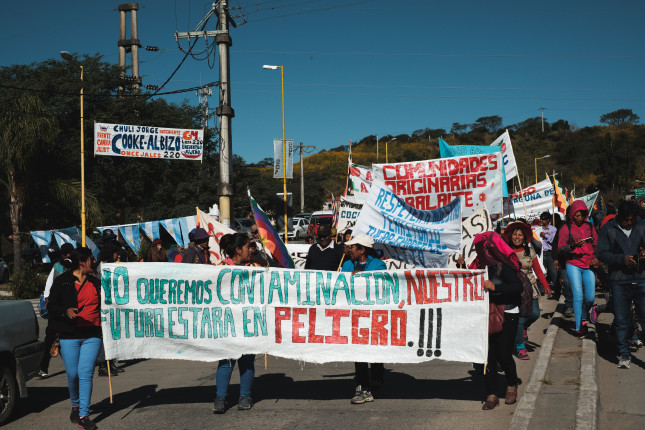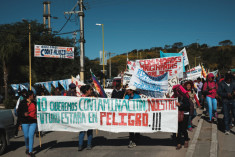-
Protecting the Protectors: Environmental Defenders and the Future of Environmental Peacebuilding
December 16, 2019 By Erika Weinthal Early scholarship on environmental peacemaking recognized the important role that local civil-society can play in promoting regional cooperation while, at the same time, pressuring governments to protect the environment. For example, in the late 1980s/early 1990s, nongovernmental organizations (NGOs), such as the Union for Defense of the Aral Sea and Amu Darya in Uzbekistan and the Dashowuz Ecological Club in Turkmenistan, were at the forefront of the fight to restore the Aral Sea and protect the region’s biodiversity.
Early scholarship on environmental peacemaking recognized the important role that local civil-society can play in promoting regional cooperation while, at the same time, pressuring governments to protect the environment. For example, in the late 1980s/early 1990s, nongovernmental organizations (NGOs), such as the Union for Defense of the Aral Sea and Amu Darya in Uzbekistan and the Dashowuz Ecological Club in Turkmenistan, were at the forefront of the fight to restore the Aral Sea and protect the region’s biodiversity.
Early scholarship on environmental peacemaking recognized the important role that local civil-society can play in promoting regional cooperation while, at the same time, pressuring governments to protect the environment. For example, in the late 1980s/early 1990s, nongovernmental organizations (NGOs), such as the Union for Defense of the Aral Sea and Amu Darya in Uzbekistan and the Dashowuz Ecological Club in Turkmenistan, were at the forefront of the fight to restore the Aral Sea and protect the region’s biodiversity.
Since 1989, the Goldman Environmental Prize has recognized the exceptional heroism of environmental activists (also referred to as environmental defenders) who take on great personal risk to bring to light environmental destruction in the face of intimidation, harassment, and retaliation. In Liberia, for example, Silas Siakor exposed how illegal logging of forests helped fuel the violent civil war there. Environmental lawyer and activist Alfred Brownell worked with local communities to halt the clear-cutting of the country’s tropical forests by palm oil plantation developers. Park rangers, like Rodrigue Katembo, in the Democratic Republic of Congo, have risked death to protect the mountain gorillas and other wildlife from armed poachers and extractive industries in national parks.
While many countries have moved from conflict to peacebuilding, the world has not become safer for environmental defenders. In 2016, Global Witness documented the murder of 200 land and environmental defenders across 24 countries. Even in countries that have embarked upon a peace process, the risks to environmental defenders remain high. In 2018, 24 land environmental defenders were killed in Colombia (out of a total of 164 worldwide that year), making it the deadliest place in Latin America for environmental defenders.
As the environmental peacebuilding community charts new directions for the next 25 years, it is imperative that we continue to support environmental defenders and civil society members as they draw attention to the threats facing the environment.
The research, analysis, and elevation of these threats by environmental defenders is key to addressing them. For example, in the midst of ongoing deadly conflicts in the Middle East organizations such as PAX, Bellingcat, and the Conflict and Environment Observatory are leveraging satellite imagery to monitor data on the environmental impacts of these armed conflicts, including the targeting of infrastructure. This information will be critical to the ability of development and humanitarian actors to respond to crises in the region and providing lessons learned on the environmental dimensions of armed conflict and their impact.
Communities, including Indigenous peoples, often experience a loss of livelihoods during conflict, and development and rebuilding decisions are likely to have direct implications for their territorial and water tenure rights. Where governance is weak, community members may experience reprisals for seeking to reclaim land upon their return, and new conflicts between communities may arise over how best to manage natural resources for sustainable livelihoods. Environmental defenders and civil society can play a critical role at war’s end in restoring livelihoods, rebuilding trust in government institutions, and fostering regional peace.
Including environmental defenders and other members of civil society in the decision-making process is vital for building a sustainable peace and fostering sustainable development. To ensure that the needs, priorities, and concerns of different community members are addressed, rights-based approaches, for example, that emphasize free, prior, and informed consent (FPIC) are particularly useful for making informed decisions about natural resource use and management.
Environmental defenders also help fight corruption, foster transparency, and build trust in government institutions and the extractive sector. Ensuring that civil society members are at the table and part of decisions regarding extractives is important if the revenues generated from the development of timber, oil, gas, and other minerals, are to benefit society. Accountability and transparency has been critical to the success of the Extractives Industries Transparency Initiative (EITI). Yet increasingly, civil society members of the EITI process have come under attack, as was the case in Azerbaijan, resulting in its suspension from the EITI Board in 2017 and subsequent withdrawal.
As the environmental peacebuilding community continues to grapple with the challenges of leveraging natural resources and the environment for building a sustainable peace, we cannot forget the fundamental role that environmental defenders play in helping societies realize the right to live in a healthy environment. The 2019 UN Human Rights Council resolution to protect environmental human rights defenders was a step in that direction, but more is needed.
Erika Weinthal is Professor of Environmental Policy and Public Policy at the Nicholas School of the Environment, Duke University. Her research focuses on global environmental politics and environmental peacebuilding.
Sources: Circle of Blue, Conflict and Environment Observatory, Crude Accountability, Environmental Peacebuilding Association, Extractive Industries Transparency Initiative, Global Witness, Goldman Environmental Foundation, The Guardian, United Nations, United Nations Office of the High Commissioner of Human Rights
Photo Credit: Photo via Shutterstock. All rights reserved.
 A Publication of the Stimson Center.
A Publication of the Stimson Center.

 Early scholarship on
Early scholarship on 

